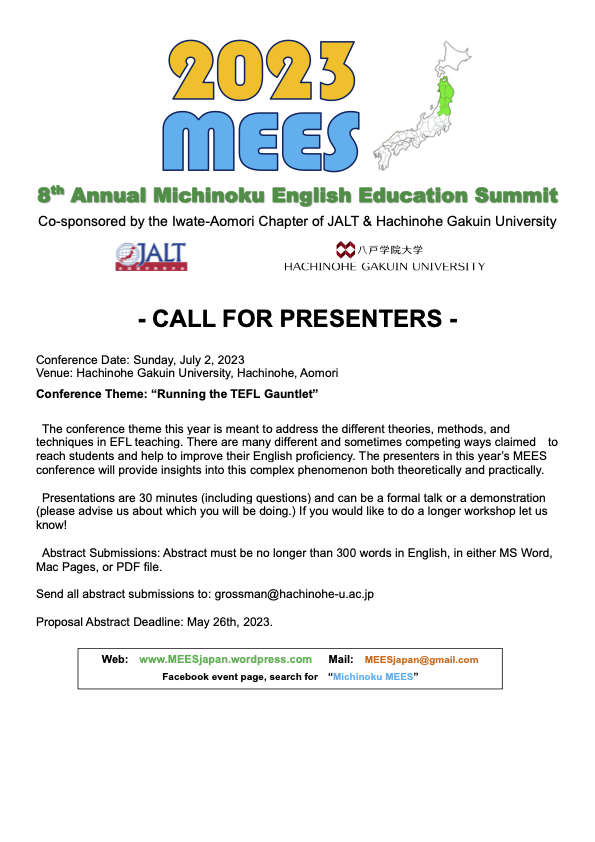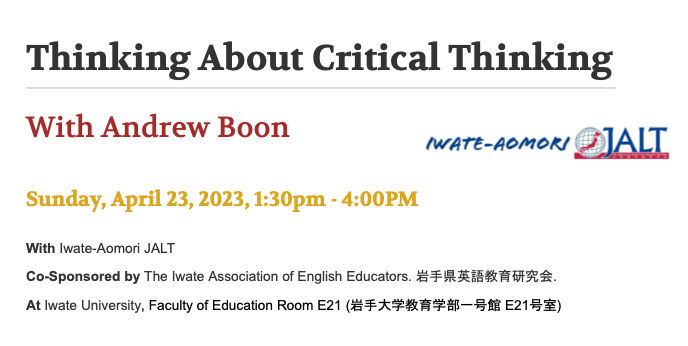
Tag: JALT
-
Thinking about Critical Thinking

With Iwate-Aomori JALT
Co-Sponsored by The Iwate Association of English Educators. 岩手県英語教育研究会.
At Iwate University, Faculty of Education Room E21 (岩手大学教育学部一号館 E21号室)
Presenter: Andrew Boon
With the proliferation of fallacious arguments, “fake news,” and untrustworthy sources in today’s multimedia landscape, critical thinking skills are vital not only in one’s native language but also when engaged in the task of language learning. The presenter will give an overview of a new book in Routledge’s ‘Research and Resources in Language Teaching’ series that provides a springboard for teaching critical thinking skills in the language classroom (Hadley & Boon, 2023). The presenter will explain what critical thinking is, outline a cyclical process for introducing students to critical thinking, demonstrate several critical thinking classroom activities that teachers can use in their classes, explore ways to incorporate critical thinking into the curriculum, and share ideas for how to create one’s own critical thinking activities.
Bio
Andrew Boon is a Professor in the Global Communications Department of Toyo Gakuen University, Japan. He holds a PhD in Applied Linguistics from Aston University, UK, and has published numerous articles on methodology, motivation, and teacher development. He is also author and co-author of several writing, listening and speaking, and news media ELT textbooks and scores of graded readers for English language learners.
Address:
020-0066
Iwate
Morioka
3 Chome-18-33 Ueda
Japan
-
Music and language in the brain: Ways to use music to facilitate language learning – Amanda Gillis-Furutaka
- Date: Sunday, February 26 1:30pm
- Location: Online – Zoom link included when you register for event
- Cost: JALT Members – Free. Non-member – 500 yen
- Event Registration is here: https://iwamorifeb26.peatix.com/view
Outline: Music is found in all cultures worldwide. It is an international language that communicates emotion across other language barriers. Importantly, listening to music involves the whole brain. We will explore how music is processed not only through our ears and auditory cortex, but also through our senses of touch and sight, and how we can recall music through visual and tactile stimuli as well as an audio stimulus. We will experience howinstrumental music activates areas of the brain associated with language. And understand why motor areas of our brain are activated automatically when we hear music, even when we are sitting or lying still. These phenomena explain why using music in a classroom is especially stimulating and conducive to learning. Participants will be invited to share the ways in which they use music in their classrooms and the positive outcomes they have experienced. The presenter will also introduce additional suggestions for using music to stimulate language learning both in the face-to-face classroom and when teaching online.
Bio: Amanda Gillis-Furutaka is a professor in the Department of English at Kyoto Sangyo University. She has an MA in TESOL from the University of Birmingham and a PhD in music from the University of London Goldsmiths College. She has taught in a variety of countries and researched in a variety of fields but her main interest these days is how to apply the latest findings in brain science to the language classroom. She is currently the Coordinator of the JALT
Mind, Brain, and Education SIG.
